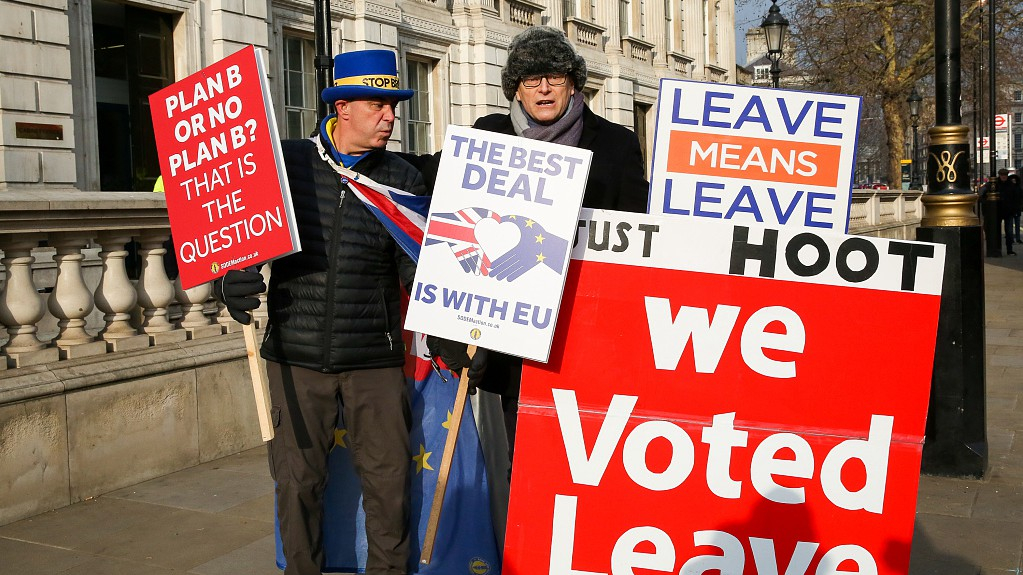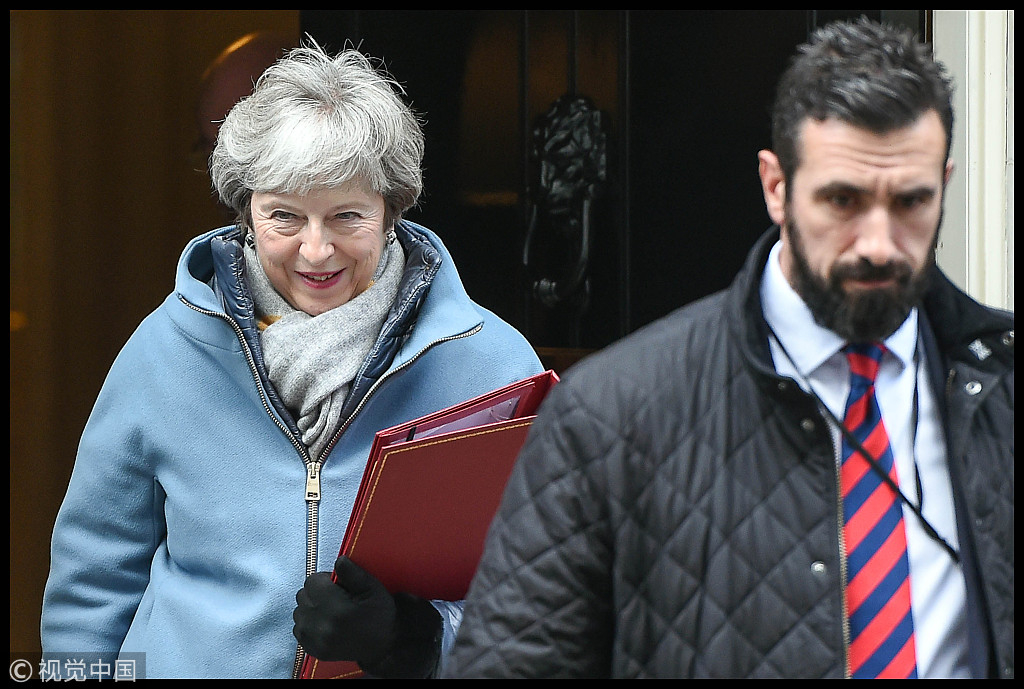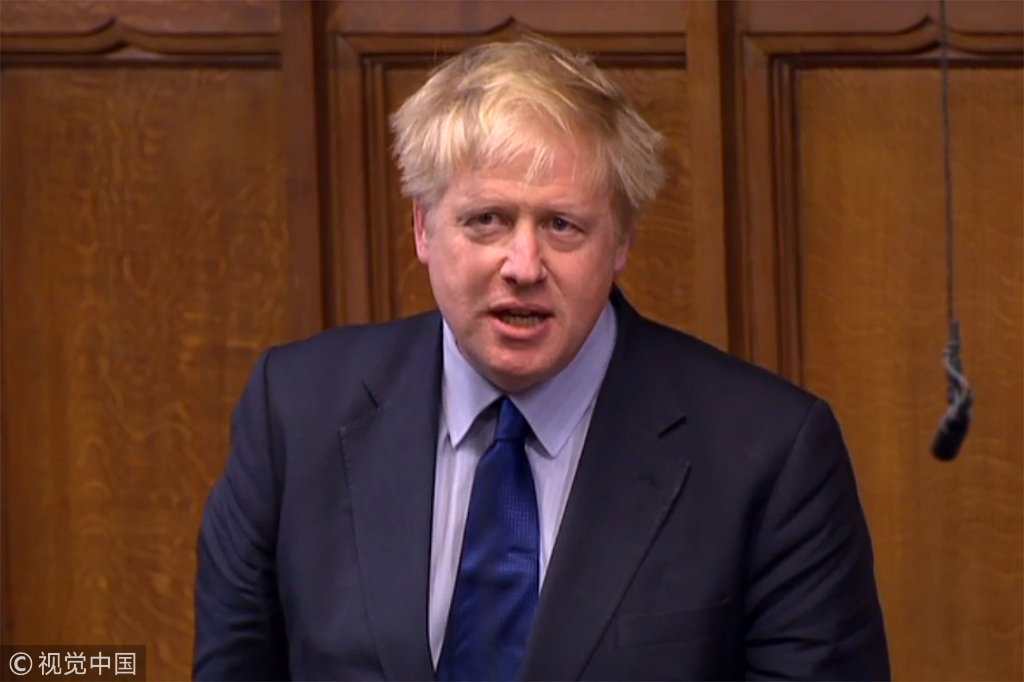
Opinion
18:11, 23-Jan-2019
Opinion: Kicking the Brexit can down the road
Tom Fowdy

Editor's note: Tom Fowdy graduated with an Msc. in Chinese Studies from Oxford University after previously majoring in Politics at Durham University. He has published a number of pieces on the international relations of China and the Democratic People's Republic of Korea.The article reflects the author's views, and not necessarily those of CGTN.
Nearly two weeks since Theresa May's proposed Brexit deal was voted down by the House of Commons, her government is no closer to salvaging any kind of alternative plans for Britain's impending departure from the European Union (EU).
With the Article 50 deadline fast approaching in March, fears have been heightened that the UK could leave Europe without a deal, a scenario widely regarded to be an economic catastrophe for the country.
So what now? Despite the obvious issues with her proposals, not just with opposition parties, but with her own, Theresa May has defiantly stood still on it, insisting that her agreement is the “only way” to prevent a “no-deal scenario”. Inevitably, others aren't convinced.

British Prime Minister Theresa May departs from Number 10 Downing Street for the Houses of Parliament to deliver a statement on Brexit. /VCG Photo
British Prime Minister Theresa May departs from Number 10 Downing Street for the Houses of Parliament to deliver a statement on Brexit. /VCG Photo
As a result, a number of MPs have been tabling alternative proposals in a bid to pressure the government to change course. Naturally, some of them include demands for a second referendum. However, there is one pragmatic solution being advocated by Labour MP and former front bencher Yvette Cooper, that is, if no agreement can be reached by Parliament on what course of action to take on Brexit, then Article 50 should be extended up until the end of 2019.
This would not be scrapping the process of departure, but delaying it, specifically with the intention of ruling out a “no deal” altogether. According to a report by the BBC, this motion not only has been given the blessing of the Labour frontbench itself, but also has found the support of some Conservative MPs.
The idea is fundamentally a good one and should be looked to as a necessary option, as it will calm the uncertainty of markets and businesses, many whom have been making urgent contingency plans in fear of the worst.
Since the shock referendum result in 2016, Brexit has posed an extremely unhealthy climate for businesses. The collapse in the value of the pound, combined with political volatility and the threat of losing access to integrated European markets have all taken their toll.
Investment in the UK has become increasingly associated with risk, leading many businesses to put plans on hold, shed jobs, or simply relocate out of the country altogether. A “no deal” outcome, where the UK would sever all customs and free trade ties with the EU by default, is consequentially viewed as an intensification of this which would be apocalyptic.
There have been endless reports of fears that a no-deal could result in drastic shortages of food, medicines and other supplies, leading some businesses to even stockpile accordingly. Although a no deal has been threatened by a small clique of noisy Brexiters, for the majority of people, it must be avoided at all costs.

Conservative MP Boris Johnson stands and speaks as he responds to Britain's Prime Minister Theresa May's statement to the House of Commons in London on January 21, 2019, on changes to her Brexit withdrawal agreement. /VCG Photo
Conservative MP Boris Johnson stands and speaks as he responds to Britain's Prime Minister Theresa May's statement to the House of Commons in London on January 21, 2019, on changes to her Brexit withdrawal agreement. /VCG Photo
Among members of parliament, there is consequentially hope that for all the factional disagreement over Brexit itself, there can be at least a common agreement that a no-deal is a worst case scenario and must be avoided. It is something that would of course unite all of those opposed to Brexit, as well as moderate/pragmatic voices within the Labour Party and most crucially, in the Conservative Party.
As a result, given that Theresa May's deal with Brussels lacks meaningful support there is a realistic sentiment that delaying Article 50 is a workable option. Such a proposal will work because it is benign.
It is carefully crafted to avoid the divisive issues of a solution to Brexit itself, or a second referendum, leaving such notions vague and thus creating space for multi-party support. The government may dislike it, as may hardcore eurosceptics, but as with the initial vote, there is enough power on all sides to overrule May… again.
Given this, the most realistic option for Parliament right now is to kick the Brexit can down the road and offer markets some much needed stability. With the threat of a no-deal Brexit minimized, stocks, the pound sterling and investors will respond positively, albeit with a sign of relief.
It will ensure a safety valve which will prevent the UK from experiencing severe economic damage if no solutions can be mustered in the ever shortening time left. A delay would further give more space for the government to renegotiate the border issue and actually create a deal which at least the Conservative party on its own, can get behind.
(If you want to contribute and have specific expertise, please contact us at opinions@cgtn.com)

SITEMAP
Copyright © 2018 CGTN. Beijing ICP prepared NO.16065310-3
Copyright © 2018 CGTN. Beijing ICP prepared NO.16065310-3